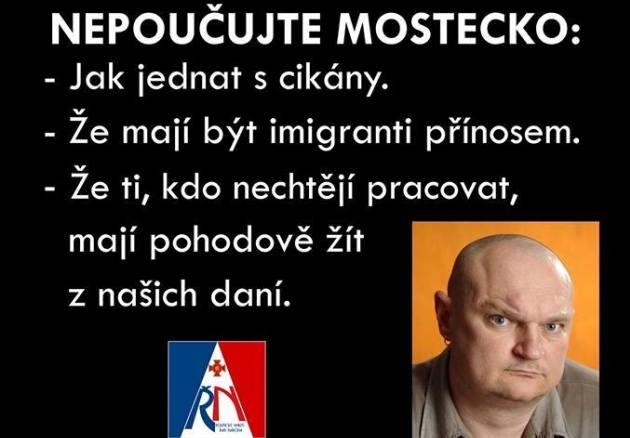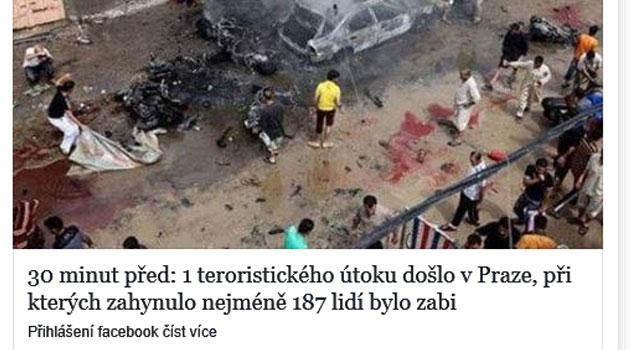Czech Republic: Politician spreads hoax that Roma get washing machines for free

Jiří Maria Sieber, who is running for Senate as a candidate for the Řád národa (“Order of the Nation”) political movement, has launched a hoax on Czech-language Facebook alleging that Romani residents of Terezín are getting washing machines for free. Allegedly, all they have to do is go to the “welfare office”, but they don’t even bother to unwrap them, instead taking them straight to the pawn shop – and it doesn’t matter to them that they only get one-fifth of the price, because they didn’t buy them, the taxpayers allegedly did.
False news items like this are a dark part of political marketing. Surprisingly, this particular hoax has also been shared by a former Minister of Labor and Social Affairs for the Czech Social Democratic Party, Zdeněk Škromach, who should know better.
Sieber offers as proof of his claims a story allegedly told by a friend of his, Martin Musil (also a member of the Order of the Nation), “who owns a bazaar in Terezín, and the gypsies frequently bring him new washing machines or new furniture bought with money from the welfare department.” Allegedly a Romani woman came there three days after the “welfare department” bought her a washing machine for CZK 5 000 (EUR 185) and was happy to sell it to the pawn broker, Musil, for CZK 1 000 (EUR 37).
The allegations continue with the surprised pawn broker asking whether she won’t have problems with the authorities for selling the appliance right away, but she allegedly just laughed and confidently claimed she would not. Sieber augments his allegations with an image of Gorenje-brand washing machines on a palette.
The image actually came from the website of a children’s charity, which published an article called “New washing machine for Klokánek Brno“. One assumes that the washing machine in the photograph used by Sieber, therefore, is not the one that was taken to the pawn broker.
“Extraordinary immediate aid” is for one time only
According to Czech legislation now in effect, a person in need can receive, in addition to other kinds of support, an extraordinary, immediate aid benefit and can use it to cover “immediately essential needs”, which include items such as beds or washing machines, but that does not mean that anybody can repeatedly apply for such benefits (as indicated by the term “extraordinary”).
“This year, as of 1 August 2016, we disbursed a total of 19 extraordinary immediate aid benefits, and in 2015 during the same period we disbursed 41. Repeat applications from the same people to buy the same items are rejected,” says Jaroslav Legner, the head of the Material Distress Department in Litoměřice, which covers Terezín.
All welfare recipients are audited
The mythical Romani woman from Sieber’s story is allegedly also calm because the “welfare department” allegedly never audits Romani applicants, so she supposedly believes nobody will ever learn that she has sold the appliance she bought with the benefits. The opposite is the case.
“We are obligated to monitor the applicants for extraordinary immediate aid, precisely because of repeat requests. This is especially the case if the applicants have moved here from another region, and we regularly meet this obligation,” Legner says.
During the last few years the Litoměřice branch of the Labor Office has addressed cases of repeat applications. “We have here just one case from 2014 where the applicant asked for a contribution toward buying a bunkbed, and she made the same request in 2015 with the justification that there had been mold in the room where the bunkbed was used, so she had to move into a different apartment and wanted a new bunkbed because the previous one had been damaged by the mold. She was not able to document her claim. Moreover, from previous experience we knew she had sold children’s clothing online, so we presumed she had probably sold the bunkbed too. Mold can be removed from wood, there was no reason to throw the bunkbed away,” Legner said.
That repeat application was officially denied. During another audit, Legner’s department noted that a recipient of extraordinary immediate aid had bought a new refrigerator, sold it, purchased a used refrigerator, and used the money to cover other needs.
Zdeněk Škromach should know
After two days, Sieber’s hoax had been shared more than 10 000 times on Facebook. One of the first to share it was former Labor and Social Affairs Minister Škromach.
On hs own Facebook profile, the ex-minister posted on 2 August that people should write to him about whether Sieber’s story was true. This was a surprising call from the politician who had submitted the current wording of the law on aid to those in material distress in 2006 and who knows very well how it works (or should know, at least).
Before that answer could be given to him, however, he had erased the post from his Facebook wall. Sieber’s hoax also included a description of a scene in a pharmacy where another probably non-existent Romani woman got five packages of Sunar baby formula free of charge using a “paper from the welfare department”.
Verification of how Romani people are treated at pharmacies has been covered elsewhere on the website Faktus.info. Surprisingly, they enjoy the same purchasing conditions as anybody else.
First published by news server Faktus.info.
